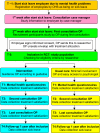Design of a randomized controlled trial on the effects of counseling of mental health problems by occupational physicians on return to work: the CO-OP-study
- PMID: 17655758
- PMCID: PMC1976112
- DOI: 10.1186/1471-2458-7-183
Design of a randomized controlled trial on the effects of counseling of mental health problems by occupational physicians on return to work: the CO-OP-study
Abstract
Background: Mental health problems often lead to prolonged sick leave. In primary care, the usual approach towards these patients was the advice to take rest and not return to work before all complaints had disappeared. When complaints persist, these patients are often referred to psychologists from primary and specialized secondary care. As an alternative, ways have been sought to activate the Dutch occupational physician (OP) in primary care. Early 2000, the Dutch Association of Occupational Physicians (NVAB) published a guideline concerning the management by OPs of employees with mental health problems. The guideline received positive reactions from employees, employers and Dutch OPs. This manuscript describes the design of a study, which aims to assess the effects of the guideline, compared with usual care.
Methods/design: In a randomized controlled trial (RCT), subjects in the intervention group were treated according to the guideline. The control group received usual care, with minimal involvement of the OP and easy access to a psychologist. Subjects were recruited from two Dutch police departments. The primary outcomes of the study are return to work and treatment satisfaction by the employee, employer, and OP. A secondary outcome is cost-effectiveness of the intervention, compared with usual care. Furthermore, prognostic measures are taken into account as potential confounders. A process evaluation will be done by means of performance indicators, based on the guideline.
Discussion: In this pragmatic trial, effectiveness instead of efficacy is studied. We will evaluate what is possible in real clinical practice, rather than under ideal circumstances. Many requirements for a high quality trial are being met. Results of this study will contribute to treatment options in occupational health practice for employees on sick leave due to mental health problems. Additionally, they may contribute to new and better-suited guidelines and stepped care. Results will become available during 2007.
Trial registration: Current Controlled Trials ISRCTN34887348.
Figures
References
-
- Brouwers EPM, Tiemens BG, Terluin B, Verhaak PFM. Effectiveness of an intervention to reduce sickness absence in patients with emotional distress or minor mental disorders: a randomized controlled effectiveness trial. General Hospital Psychiatry. 2006;28:223–229. doi: 10.1016/j.genhosppsych.2006.02.005. - DOI - PubMed
-
- OECD Economic Surveys: Netherlands. Reform of the sickness and disability benefit schemes. 2004.
-
- National Mental Health Association USA. Mental health facts. 2004. http://www.nmha.org
-
- The Mental Health Foundation UK. Statistics on mental health, the costs of mental health problems. 2003. http://www.mentalhealth.org.uk
Publication types
MeSH terms
Associated data
LinkOut - more resources
Full Text Sources
Medical
Research Materials
Miscellaneous



